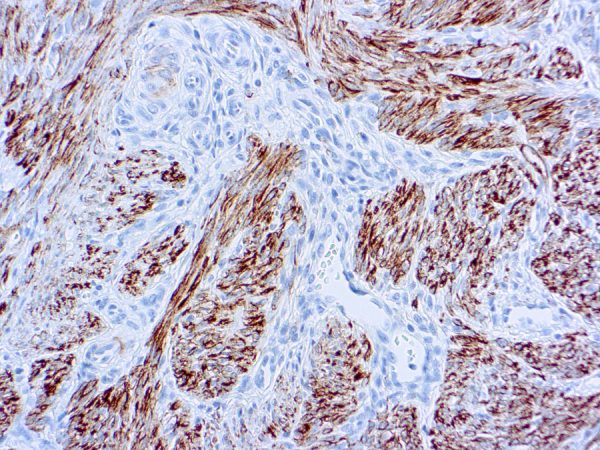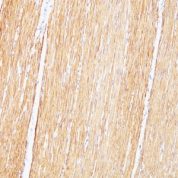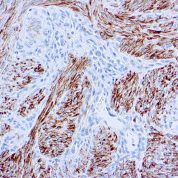Antibody (Suitable for clinical applications)
Sample Type: FFPE Patient Samples.
Tested Applications: IHC. Approved for In Vitro Diagnostic Procedures on FFPE tissues. For tissue collection recommendations, please see datasheet sent with product.
Application Notes
| Specification | Recommendation |
|---|---|
| Recommended Dilution (Conc) | 1:20-1:40 |
| Pretreatment | Citrate Buffer pH 6.0 |
| Incubation Parameters | 30 min at Room Temperature |
Prior to use, inspect vial for the presence of any precipitate or other unusual physical properties. These can indicate that the antibody has degraded and is no longer suitable for patient samples. Please run positive and negative controls simultaneously with all patient samples to account and control for errors in laboratory procedure. Use of methods or materials not recommended by enQuire Bio including change to dilution range and detection system should be routinely validated by the user.
Clonality: Monoclonal
Anti-Desmin Antibody Clone: D33
Host and Isotype: Mouse IgG1, kappa
Recommended Positive Control Sample: Leiomyoma
Cellular Localization of Antibody D33 Staining: Cytoplasmic
Buffer and Stabilizer: PBS with 1% BSA and 0.05% NaN3
Antibody Concentration: Lot specific. Plese contact tech support for data.
Immunogen: BALB/C mice were immunized with purified desmin from human muscle.
Storage Conditions: This antibody should be stored refrigerated (2-8°C). This product should not be used past the expiration date printed on the vial.
Desmin Information for Pathologists
Summary:
53 kDa intermediate filament first described in 1976 (Proc Natl Acad Sci USA 1976;73:4344), present near the Z line in sarcomeres, present in cardiac, smooth and striated muscle (Wikipedia). Expressed before actin in myoblasts. Variable expression in myofibroblasts. Uses by pathologists Common stain used in panels for mesenchymal markers.Common Uses By Pathologists:
Common stain used in panels for mesenchymal markers. Confirms myogenic origin of tissue / tumors. Helps differentiate smooth muscle tumors (desmin+) from GIST (c-kit+, almost always desmin-). In serous effusion, more common in reactive mesothelial cells (84%) than mesothelioma (8%) or carcinoma (2%, Am J Surg Pathol 2001;25:1405). Diagrams / tablesLimitations and Warranty
This antibody is manufactured in accordance with clinical good manufacturing practices in an ISO13485:2016 certified production facility. It is intended for multiple uses including in vitro diagnostic use and research use only applications. Please see vial label for expiration date. We strive to always deliver antibodies with a shelf life of at least two years.








-178x178.jpg)
There are no reviews yet.